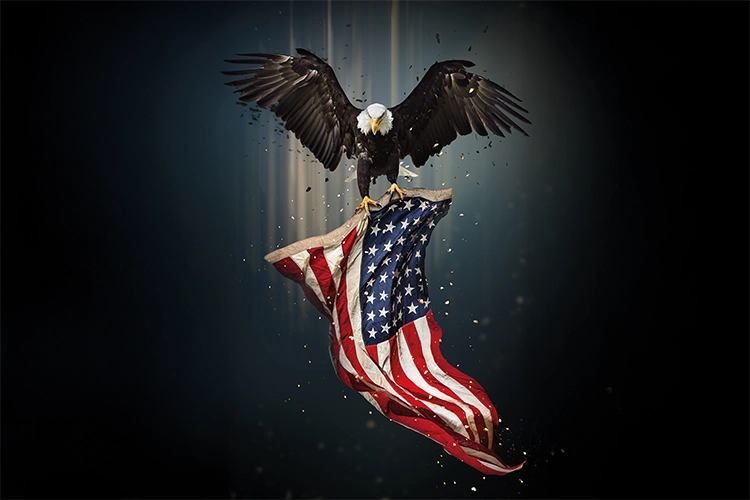

Geopolitical Hotspot
Tim Marshall asks whether it’s the end of an era, or just America’s Orange Period
Another day, another Trumpism, another era. That’s where we are now; a new reality — the post-post-Cold War era. We don’t clearly know what it looks like, but the old certainties have come to an end. This leads to questions. Is it the end of Pax Americana and the American century? Can Europe come together militarily? Is Russia a threat?
We can take these in turn. First, though, the context of the change.
It was inevitable that this moment would come. All regional orders and empires have a use-by date, as the Romans, Ottomans, British and Soviets discovered. Another example is the Concert of Europe, introduced in 1815 to balance power in an attempt to prevent war. These systems become familiar, the road map navigable, but when they fragment, we become anxious.
It’s not clear if the USA is firmly back in an ‘isolationist’ mood or if this is just its Orange Period. George Washington’s 1796 Farewell Address sowed the seeds of isolationism. On relations with other nations he said: ‘To have with them as little political connection as possible.’ On Europe: ‘Why, by interweaving our destiny with that of any part of Europe, entangle our peace and prosperity in the toils of European ambition, rivalship, interest, humour or caprice?’
It took more than 140 years before entanglement came. Even then, when the USA joined a coalition of states to fight Germany in 1917, it was as an ‘associated power’, not an ally. It entered the First World War not only to help ‘defend democracy’ but to prevent a single power from dominating the continent and so threatening America’s eastern seaboard. It was the same story in the Second World War and the Cold War, although this time with formal treaties.
Subscribe to Tim Marshall’s Substack here: https://substack.com/@itwitius
Presidents Roosevelt and Truman tried to create a multilateral order to make the post-war era safer for capitalism and liberal democracies. Subsequent US leaders agreed that the USA was stronger if it led a coalition of like-minded countries against the threat of Communism.
Now, the world has changed, and so have America’s priorities. Soviet Russia was defeated in the Cold War and Chinese power has rapidly grown. Russia has become less important for the Americans, but not for the Europeans.
Anyone with a grasp of geography, history and modern politics should have been able to see that Russia wouldn’t accept its diminished status. Despite this, Europe was content to let its defences down and instead watch the Americans pay for them. As long ago as 1959, President Eisenhower was saying in private what Trump says out loud – that the Europeans were close to ‘making a sucker out of Uncle Sam’. And yet, when the wheel of history turned and US defence secretary Pete Hegseth told them in Brussels that ‘stark strategic realities prevent the United States of America from being primarily focused on the security of Europe’, the Europeans appeared shocked.
President Trump doesn’t appear to factor shared values into a relationship – only a cost-benefit analysis. His stance on Ukraine is an example. The defence of a (flawed) democracy after its invasion by an aggressor bent on colonialism is not, for him, a matter of principle. Instead, it’s a matter of gaining control of its natural wealth and winning economic deals with the invader. He may be right when he castigates the Europeans for their negligence on defence capabilities, but to twice vote with Russia and against Ukraine and European allies, as the USA did at the UN in February, was one of many signals that we’re in new times.
Those votes were noticed everywhere, especially in the Asia-Pacific. Taiwan, South Korea, the Philippines and Japan were left wondering if Washington would sell them out in exchange for a grand bargain with Beijing.
So, to the questions above. The end of Pax Americana? Not yet. If the Europeans can pay their way and become credible partners, an American-led NATO might survive. If not, Washington will pick and choose its allies and its fights. End of the American century? Hardly – the USA has the world’s largest economy and the world’s most formidable military. Seven of the world’s ten top universities are in the USA. Eight of the top ten tech companies are there. Can Europe come together militarily? A work in hasty progress that will probably slow. Is Russia a threat? Yes, but not to the Americans. The Ukraine war has shown Washington that the Russian army would struggle to get to Europe’s Atlantic coastline.
Nevertheless, Moscow is closer to a decades-old dream – to break NATO and dominate Europe. We’re back in the era of great power politics, and of at least four years of America First. If Europe puts its blinkers back on — it may be longer.




